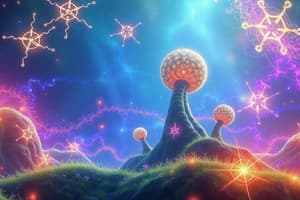Podcast
Questions and Answers
What is the primary role of genes within cells?
What is the primary role of genes within cells?
- To support the structure of the cell
- To generate energy for cellular processes
- To absorb nutrients from the environment
- To transmit information from parents to offspring (correct)
Which of the following best describes the structure of DNA?
Which of the following best describes the structure of DNA?
- A linear sequence of amino acids
- A single stranded molecule with no specific shape
- A double helix composed of four building blocks (correct)
- A circular structure made of ribonucleic acids
How are genes organized within a cell?
How are genes organized within a cell?
- Stored in a single large protein
- Located only in the ribosomes
- Grouped into structures called chromosomes (correct)
- Scattered randomly throughout the cytoplasm
What do genes control in a cell?
What do genes control in a cell?
What do the building blocks of DNA primarily consist of?
What do the building blocks of DNA primarily consist of?
What is the consequence of changes in the sequence of a gene's building blocks?
What is the consequence of changes in the sequence of a gene's building blocks?
Which of the following statements about genetic inheritance is true?
Which of the following statements about genetic inheritance is true?
In what form is genetic information primarily stored in a cell?
In what form is genetic information primarily stored in a cell?
What characterizes emergent properties in the hierarchy of life?
What characterizes emergent properties in the hierarchy of life?
Which of the following best describes the role of a cell in the context of life's properties?
Which of the following best describes the role of a cell in the context of life's properties?
What is a distinguishing feature of prokaryotic cells compared to eukaryotic cells?
What is a distinguishing feature of prokaryotic cells compared to eukaryotic cells?
Which of these statements about eukaryotic cells is accurate?
Which of these statements about eukaryotic cells is accurate?
What process do cells undertake to maintain their complex organization?
What process do cells undertake to maintain their complex organization?
Which of the following statements reflects the function of membranes in all cells?
Which of the following statements reflects the function of membranes in all cells?
What is an organizing principle of life's hierarchy from atoms to organisms?
What is an organizing principle of life's hierarchy from atoms to organisms?
How do cells give rise to new cells?
How do cells give rise to new cells?
What is the main mechanism of evolution proposed by Charles Darwin?
What is the main mechanism of evolution proposed by Charles Darwin?
What does the term 'descent with modification' mean in the context of evolution?
What does the term 'descent with modification' mean in the context of evolution?
What happens to traits that increase an individual's survival and reproduction over generations?
What happens to traits that increase an individual's survival and reproduction over generations?
How does scientific reasoning differ from scientific theories?
How does scientific reasoning differ from scientific theories?
What is a hypothesis in scientific inquiry?
What is a hypothesis in scientific inquiry?
What is one characteristic of a scientific theory?
What is one characteristic of a scientific theory?
Which best describes the role of inductive reasoning in science?
Which best describes the role of inductive reasoning in science?
Why is natural selection considered a primary mechanism for evolutionary adaptation?
Why is natural selection considered a primary mechanism for evolutionary adaptation?
Flashcards
Energy flow in ecosystems
Energy flow in ecosystems
The movement of energy through an ecosystem, starting with the sun and flowing to producers, consumers, and ultimately being released as heat.
Producers
Producers
Organisms that produce their own food through photosynthesis, primarily plants.
Consumers
Consumers
Organisms that obtain energy by consuming other organisms, including animals.
Decomposers
Decomposers
Signup and view all the flashcards
Photosynthesis
Photosynthesis
Signup and view all the flashcards
DNA
DNA
Signup and view all the flashcards
Genes
Genes
Signup and view all the flashcards
Chromosomes
Chromosomes
Signup and view all the flashcards
Evolution
Evolution
Signup and view all the flashcards
Natural Selection
Natural Selection
Signup and view all the flashcards
Adaptation
Adaptation
Signup and view all the flashcards
Inductive Reasoning
Inductive Reasoning
Signup and view all the flashcards
Deductive Reasoning
Deductive Reasoning
Signup and view all the flashcards
Hypothesis
Hypothesis
Signup and view all the flashcards
Scientific Theory
Scientific Theory
Signup and view all the flashcards
Descent with modification
Descent with modification
Signup and view all the flashcards
Emergent Properties
Emergent Properties
Signup and view all the flashcards
Cell (Structural & Functional Unit)
Cell (Structural & Functional Unit)
Signup and view all the flashcards
Cell Membrane
Cell Membrane
Signup and view all the flashcards
Prokaryotic Cell
Prokaryotic Cell
Signup and view all the flashcards
Eukaryotic Cell
Eukaryotic Cell
Signup and view all the flashcards
Organelle
Organelle
Signup and view all the flashcards
Hierarchy of Organization
Hierarchy of Organization
Signup and view all the flashcards
Study Notes
Chapter 1: Biology - Exploring Life
- Biology is the scientific study of life.
- Properties of life include:
- Order - highly organized structures
- Reproduction - ability to reproduce their kind
- Growth and development - consistent growth and development directed by DNA
- Energy processing - using chemical energy for activities and chemical reactions
- Response to the environment - ability to respond to environmental stimuli
- Regulation - maintaining internal environment within limits
- Evolutionary adaptation - adaptations that evolve leading to greater reproductive success
Themes in the Study of Biology
- Biological organization, from smallest to largest:
- Biosphere - all environments on Earth
- Ecosystem - organisms and their physical environment
- Community - all organisms in an area
- Population - all individuals of a particular species
- Organism - individual living thing
- Organ system - several organs working together
- Organ - structure made of tissues performing a function
- Tissue - group of similar cells
- Cell - fundamental unit of life
- Organelle - membrane-bound structure performing specific functions
- Molecule - cluster of atoms
- Atom - smallest unit of a chemical element
Emergent Properties
- New properties arise in each step of the hierarchy of life, arising from the arrangement and interactions within the components.
Cells
- Cells are the structural and functional unit of life. All cells:
- Are enclosed by a membrane that regulates passage of materials.
- Use DNA as genetic information.
- Two basic types:
- Prokaryotic cells - simpler, smaller, were the first to evolve
- Eukaryotic cells - contain membrane-enclosed organelles and DNA; found in plants, animals, fungi, and many protists.
Living Organisms and Environments
- Living organisms interact with their environment exchanging matter and energy.
- In most ecosystems:
- Plants are producers, providing food.
- Consumers eat plants and other animals.
- Decomposers recycle elements, changing complex matter into simpler mineral nutrients (e.g., in soil).
- Dynamics of ecosystems include two processes:
- Recycling chemical nutrients (atmosphere and soil) through producers, consumers, and decomposers
- One-way flow of energy (enters as sunlight, converted to chemical energy by producers, passed to consumers, and exits as heat).
Evolution
- Evolution explains the unity and diversity of life encompassing billions of years and evolving life forms.
- In 1859, Charles Darwin published "On the Origin of Species by Means of Natural Selection":
- A large amount of evidence supports the idea of evolution; descendants of ancestral species changing over time.
- Natural selection is a mechanism of evolution. Individuals better suited to their environment have a higher chance to survive and reproduce passing beneficial traits to the next several generations. This drives evolutionary adaptation.
The Scientific Method
- Observation - noticing specific features.
- Hypothesis - proposed explanation for an observation. A good hypothesis is both testable and falsifiable.
- Prediction - specific results expected if the hypothesis is true.
- Experiment - designed to test the prediction.
- Test outcome and conclusion - decide if hypothesis is supported, revised or discarded.
- Variables:
- Independent variable - the factor deliberately changed by the scientist.
- Dependent variable - the factor being measured as a result of the change.
- Controlled variables - factors that remain constant.
- Control - subject not exposed to the treatment.
Research Project Example
- Observing/generalizing about species mimicry.
- Testing the hypothesis using a controlled experiment (experimental group vs. control) with data that supports or refutes the hypothesis.
Studying That Suits You
Use AI to generate personalized quizzes and flashcards to suit your learning preferences.




